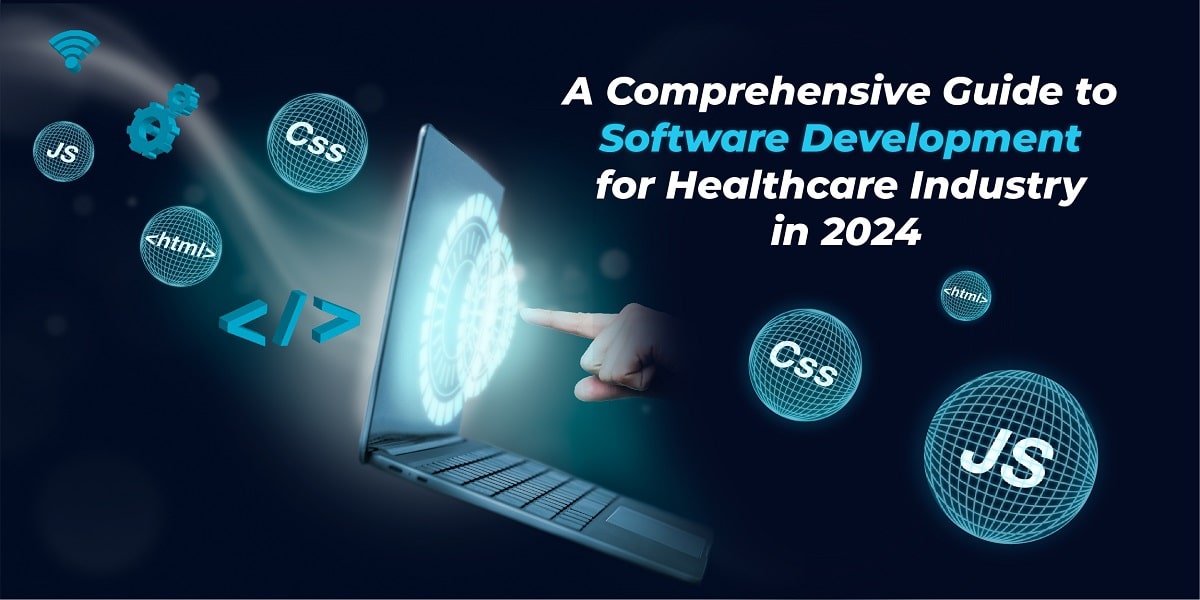A Comprehensive Guide to Software Development for Healthcare Industry in 2024

The healthcare industry is an evergreen and ever-evolving industry all over the world. Good healthcare facilities are one of the basic needs of all living beings. According to Precedence Research, in 2023, the revenue of the healthcare industry was found to be $12.31 trillion. The same research report has also projected that by 2033, healthcare industry revenue will reach $22.57 trillion, almost double.
However, even success, growth, and expansion have their challenges, and therefore, even the healthcare industry is facing various challenges right now. According to a report by Health eCareers, a recruitment network for healthcare professionals, around 49.9% of healthcare professionals have admitted that they suffer from burnout. Also, around 60% of healthcare professionals have already planned to quit their jobs due to continuous stress and heavy workloads.
So, What is the Solution?
Well, these issues have only one solution: healthcare software development. While the Healthcare Industry is ever-evolving, the Information and Technology Industry is ever-revolutionizing. For decades, the IT industry has been supporting other business industries in their growth and seamless functioning through software, apps, and IoT infrastructure development by automating myriad business tasks.
This article discusses some of the daunting challenges faced by the healthcare industry and how software development for the healthcare industry can help the former overcome those challenges.
Healthcare Software Development: An Introduction
Healthcare Software Development is the act of crafting digital solutions for the healthcare industry that:
- Automate Complex Business Processes
- Streamline the Workflows
- Enables sensitive data storage, retrieval, and management
- Assist the Medical Professionals
In general, healthcare software makes the patient's and doctor's journey seamless by streamlining administrative tasks. Also, it establishes an ecosystem for medical professionals and patients that may be accessed and managed at anytime, from anywhere. All in all, software development for the healthcare industry has improved the quality of care to a great extent.
Currently, the Healthcare industry has been facing many changes. However, a couple of suitable software tools can help the healthcare industry overcome these daunting challenges. So, let us first have a look at the challenges faced by the healthcare industry:
Healthcare Industry Challenges
However, currently, the healthcare industry has many challenges to face. But the following challenges are highly threatening and need to be addressed at the earliest:
- Massive Records and Documentation: The healthcare industry depends heavily upon documentation and record-keeping, as patient records have to be maintained. This process is not only complex but also requires high level of paper consumption. Additionally, maintaining and warehousing too many hard copies is already difficult for healthcare organizations.
- Long Work Durations: The Healthcare industry has to be open to work 24*7. However, it suffers a workforce shortage (as becoming a health professional is rocket science!). Eventually, the limited workforce is forced to work for longer hours. It leads to:
- Employee Burnout: When professionals are made to work for long hours again, they feel burnout. This further results in poor efficiency and absent-mindedness. This is not only a kind of exploitation for the medical professional but also a threat to the patient’s life. Have you ever encountered news like “Doctor Forgets Pair of Scissors in Patient’s Stomach After Surgery”? Well, now you know the reason!
- Limited Per-Patient Time: Sometimes, hospitals force their doctors not to spend too much time on a single patient and ‘wind up’ as many patients as early as possible. This destroys the quality of care, and even the doctor regrets not being able to serve in the way he had dreamed during college.
Benefits of Healthcare Software: How Software Development Helps Overcome These Challenges?
Some common benefits of healthcare software development include:
Increased Efficiency:
Automating complex administrative business processes and streamlining workflows enhances the efficiency of the organization. With AI-driven tools, a healthcare business can finish complex tasks in less time with more accuracy. Eventually, the efficiency increases.
Improved Quality of Care:
When complex tasks are automated, medical professionals become able to focus more on their professional services, such as diagnosis, analysis, and taking care of patients. Also, with patient data, doctor availability, and pharmacy inventory information quick to access universally, the treatment process speeds up and the quality of care is enhanced.
Elimination of burnout:
The main purpose of healthcare software development is to reduce the work and burden of healthcare professionals. When most of the tasks are automated, the workload of the medical professionals is reduced, saving them from burnout.
Optimized Business Process:
Healthcare software products are designed in such a way that they not only automate but also streamline complex workflows. Additionally, being AI-driven, software can perform complex business processes faster and with greater accuracy.
A Universal Ecosystem:
Using software tools like electronic health records helps create a universal ecosystem. A universal ecosystem in turn enables people to store, access, retrieve, manage, and use patient’s crucial data, such as ongoing medication and medical history. This also improves the quality of care.
Improved inventory management:
Pharmacy Inventory management software products help optimise the inventory warehousing, stock availability, and expiry product tracking processes. Likewise, within the hospital, surgical products, sanitizers, and other pharmaceutical products are consumed. A software tool helps keep track of the stock.
Timely Patient Life Care:
Today, healthcare software development has resulted in a dedicated system of Internet of Medical Things (IoMT) that is connected devices. When fitness apps and variables are connected with the doctor’s smart systems, it becomes much easier to provide timely care to the patient. Did you know that in 2023, the Apple Watch saved the life of its owner when he met an accident by immediately calling an ambulance?
Better Record-Keeping:
With well-defined and interconnected software tools, record-keeping becomes organized and well-managed. Record-keeping is a crucial part of the healthcare industry. Eventually, it will need to be addressed meaningfully. Manual record-keeping is not only hectic but also harmful to the environment due to heavy paper usage. Healthcare software solutions solve both issues.
And many more.
Top Software Solutions for the Healthcare Industry
Healthcare software is a boon for the healthcare industry. Today, there are many different types of software tools present that help the industry combat the challenges we discussed above. So, let us have a quick view of certain popular types of healthcare software products that can help healthcare professionals optimize their workflow and enhance their productivity.
Hospital Management Software or Practice Management Software
To manage a hospital or even a clinic with a myriad of patients, many administrative tasks have to be performed. For example, appointment scheduling, billing, health insurance claim management and more. However, a healthcare firm can automate all these processes with the following types of software tools:
Online Appointment Scheduling Software
To schedule and book appointments online, there are online appointment scheduling software products. This software automates appointment scheduling and streamlining in the required sequence. Also, they notify the doctors and patients accordingly.
Invoice & Billing Software
Even for billing and invoice generation, the IT industry has formulated Billing software products. Also known as Medical billing software, these software products can also manage health insurance claims and adjust the bills accordingly.
So, Hospital Management software or practice management software automates the manual appointment scheduling and billing processes, reducing the workload of front-office executives, OPD staff, and accounting professionals.
Electronic Health Record Software (EHR)
It is vital to maintain the health record of a patient for every healthcare business. A patient’s medical history, ongoing medications, past medications, and or specific allergies are important data for the doctor to know mandatorily. However, collecting this data from the patient might be a time-consuming process, and hospitals provide only limited time per patient.
Also, there are chances that the patient might forget to share every single detail about him/her. Therefore, having an Electronic health record system (EHR System) can be the best practice to overcome these challenges.
E-Prescription Software
Prescribing medicines and treatment processes on paper prescriptions has its advantages and disadvantages. The advantage is that it is an easy way to prescribe medicines. However, the disadvantage is paper dependency and the possibility of being misplaced by the patient. To combat this situation, e-prescription software has been devised by IT firms. The E-Prescription software has multiple benefits, of which the two most important include:
- Connectivity to the EHR Systems and contribution towards maintaining patient health records.
- Universally accessible. Eventually enabling the patient to avail of healthcare facilities with detailed health records at any place in the world without having to worry about previous prescriptions.
Patient Monitoring Software Solutions
Patient monitoring software is the type of healthcare software that supports medical fitness devices and health and fitness wearables such as smart watches, patient diagnostic tools, and remote check-up tools. Software that helps doctors diagnose the patient digitally (and sometimes remotely too) is called patient monitoring software.
They help the doctor collect the patient’s BP and Heart Rates, signals of declining health, and symptom relevancy to a disease. Say for example, digital stethoscopes, heart rate monitors in smart watches, and smart inhalers that keep the doctor updated about the condition of his asthmatic patient. This software keeps the patient in check and helps the doctors stay updated on the patient’s health. Eventually, in case of an emergency, it becomes easier to offer on-time treatment to the patient.
Medical Imaging Software
Medical Imaging Software is another type of boon for the healthcare industry. They produce high-definition 3D images from MRI, CT scans, and X-ray machines. It helps the doctors analyze the patient’s health conditions, especially injuries, with 3D modelling technology.
It allows the doctor to have a minute and close check on the patient’s internal condition without having to penetrate him/her. Medical Imaging software in this way improves care quality, simplifies the patient’s diagnosis, and assists the doctor in diagnosis.
Laboratory Information Management Software
Collecting patient samples regularly and keeping a manual record of the sample’s lifecycle is a complex task. It requires a large workforce and a highly focused work environment. However, Laboratory Information Management Software automates these processes and keeps a detailed track of sample lifecycle management and test result record-keeping with analytical report generation.
Pharmacy Management Software
Inventory management and warehousing management solutions for pharmaceutical businesses help pharmacies stay updated on their inventory. Pharmacy management software:
- Automates tracking inventory and keeping the stock updated
- Sends notification of expiring products
- Makes a list of the inventory to be purchased
- Keeps record of the entire stock
- Initiate orders when needed
- Connects with the E-prescriptions and helps the pharmacist keep the medicines ready
This way, it speeds up the patient's journey.
Telemedicine Software
These days, remote patient monitoring is trending high after the pandemic. So, telemedicine software products make remote diagnosis, consultation, and treatment possible. They offer video consultation, online appointment scheduling, and remote monitoring of the patients.
However, infrastructure is the only drawback of the telemedicine industry. Remote monitoring requires good infrastructure availability both at the doctor’s and at the patient’s. For example, digital stethoscopes, wearable devices, smart inhalers, edible sensor pills, etc.
The Latest Trends in Healthcare Software Development 2024
Whatever the software solution, every healthcare software product must follow the latest development trends. To stay competitive and stand firm in the ever-changing environment, the software development company has to focus on certain tech stacks to stay in line with the latest trends. At present, the following technologies for developing healthcare software are trending high as of 2024:
Virtual Reality
Virtual Reality, in simple words, is a technology that creates a digital environment that seems real and allows people to interact with that digital environment. For example, in the healthcare industry, today practicing surgeons can wear headsets and perform surgery on 3D models that seem real.
Augmented Reality
Augmented Reality is one step ahead of Virtual Reality. While virtual reality offers an immersive experience through VR headsets, Augmented Reality brings digital elements to the real world to simplify life. Say, for example, that in the healthcare industry, one simple example is 'AccuVein', a software that projects veins on the human body to help medical professionals take blood samples and inject medicines.
Robotics, AI & Machine Learning
These days, coupled with AI, AR, VR, and machine learning, robotic surgeries are a revolutionizing solution for the healthcare industry. Robotic surgeries are possible with the help of Artificial Intelligence and Machine Learning developments.
Through Machine learning, the robots are trained to perform surgery and with AR and VR setups, it is possible to monitor and guide the robot by a professional doctor. AIMS in India has already implemented this technology and so far, no errors have been found. Moreover, this trend has helped reduce the working hours and burnout rates of medical professionals.
Blockchain Development
Blockchain Development is a trending development technology that offers a decentralized development process, unlike traditional web development technologies that use centralized development. However, to be straightforward, blockchain development has two major benefits:
- More data security
- Connectivity across different devices
Eventually, blockchain development will continue to intrigue the healthcare software development industry in 2024 as well.
Internet of Medical Things (IoMT)
The Internet of Medical Things is a very vast topic that requires another dedicated blog post to explain fully. However, in brief, IoMT can be explained as a system in which all the smart devices used in the medical industry are interconnected. These medical devices can be
- Computer Systems
- Diagnostic Devices (MRI, CT Scan, X-ray and other machinery items)
- Smart devices for patients, such as smart inhalers, dialysis systems, wheelchairs, etc
- Digital Stethoscope
- Smart Watches
- Health and Fitness Apps
Interconnected devices help the healthcare industry in remote and on-time treatment. At present, it is a pipelined project and requires extensive development. So, at its highest, IoMT is going to dominate the healthcare software development market.
To Sum Up, we can say that the healthcare software development industry must continue to learn, polish, and offer AR, VR, ML, AI, and IoMT infrastructure and software development services to stand out in the rapidly growing market.
Custom Healthcare Software Development: More Precise Solutions
Ready-to-use software products may or may not be fit for different healthcare organizations. Every healthcare business has a different customer base, customer volume, business model, and speciality. Therefore, custom healthcare software development is another highly demanding software development service.
With custom development, a healthcare organization can reduce the complexity of a software product and optimize the cost of development. So, let’s understand custom healthcare software development in detail.
What Are Custom Healthcare Software and Why is it Better?
Custom Healthcare Software Development is the act of getting healthcare software developed by a software development company with personalized features, UI/UX Design, and functionalities. When you get customized healthcare software, it gives you the freedom to drop unnecessary features and functions. It helps get a simple and straight-forward software solution that fits your specific requirements.
Moreover, by choosing the features and functions of a software solution in custom healthcare software development, you also get the opportunity to choose the User Interface design. Eventually, you can simplify the user interface as per the technical calibre of your employees.
How do I get custom healthcare software development services?
Where can I get custom healthcare software? Well, here is the answer: taking services from a custom software development company’! So, you can approach a software development company after researching on Google and ask them if they provide custom software development services.
And they do! You can share your software requirements with their sales team and the software developers and ask them to share a Figma or software prototype with you. This way, you can get an idea of their development skills and get a bespoke software design that fits your healthcare organization.
Custom Healthcare Software Development Process
For custom healthcare software development, even the client has to be quite active throughout the development process. Unlike being passive, you, as a client, will have to partake in the custom healthcare software development process, which is defined below:
Project Requirement Discussion:
Custom Healthcare Software initiates from the client’s end. The role of the client remains active throughout the development process. Firstly, the client will have to share the project requirements, which include the features and functions you require in the software along with the UI/UX requirements. In custom healthcare software development, the client has to take the lead.
Approving The Software Prototype:
As per the client’s description, the custom healthcare software development company develops a graphical representation of the software product to be delivered. This is a software prototype on Figma Design. When the client approves the prototype, then the company initiates the development process. At this stage, the client can also offer his/her valuable feedback and ask the company to execute the changes.
Healthcare Software Development:
After the approval, the software development company starts the healthcare software development process with expert software developers. At this stage, the software developer performs backend development and front-end development. Here, the client may receive regular updates from the developer team.
Robust Testing:
Once the development process is complete, the software is tested with manual and automated testing procedures. Until the software product does not pass all the quality standards, the company does not deliver it. At this stage, the client may sit relaxed and inactive.
Implementation & Training:
Once the testing process is complete, the client again has to take an active role and learn how to operate the software product. After the implementation and learning phase is complete, the client is free to introduce the software to the organization.
Must-Have Features in a Healthcare Software Solution
However, even if you are going for custom software development, you can’t go blank to the company and must prepare a list of the features and functions you wish to have in the software. Although here are some must-have features that you should list down at every cost:
User Registration
The admin of the software must get a user registration feature so that he or she may access the admin panel as and when required. Moreover, this feature helps the administrator monitor the activities taking place on the software within the organization.
Doctor Registration
If a remote consultation feature has been added to the software, doctor’s registration is also necessary. So that he or she may be an active member of the platform, delivering his/her services as and when required through the software.
Profile Creation
Profile creation for both doctors and patients must be available, so the availability, timing, qualifications and specializations of the doctors may be accessed by the care seeker. Likewise, profile creation for the patient is also necessary so that this data may be linked with the EHR for better treatment.
Push-Notifications
Push notifications and alerts related to emergencies, appointment timings, discounts, etc must also be provided to all the associated members (doctors, other medical professionals, and patients). This helps streamline appointments and business tasks without delays.
Patient Health Tracking
The software must be connected with the EHR systems and the smart devices the critical patients are using. This helps healthcare professionals encounter emergencies as soon as possible and take timely action. This can help save the life of a patient to a great extent.
GPS Tracking
For critical patients, GPS tracking must also be available so that, in an emergency, the ambulance can track the patient and reach him/her on time. However, if the healthcare organization is small and the number of critical patients is small, then it may drop this feature.
In-App Calling and Messaging
Communication is very important in the healthcare industry. A single communication error may cost the life of a patient and stain the career of healthcare professionals. Eventually, in-app calling and messaging features that run smoothly must be implemented.
Software Connectivity
Whatever software product the healthcare organization is developing must support interconnectivity with the smart devices being used by patients, EHR systems, and other relevant software products.
Challenges in Healthcare Software Implementation
However, healthcare software development is a necessity these days for both healthcare organizations and society, but they has their limitation. At present, high cost, lack of tech literacy, and lack of expert healthcare software developers are daunting barriers towards this kind of development.
Computer Literacy
Healthcare professionals might lack computer literacy due to being stuck in theories and practicals on the bodies of living beings. Eventually, providing computer literacy to them is not a challenge but making them learn extra skills might be one. They might show reluctance due to already long working and learning hours and massive learning patterns.
IoMT Infrastructure
The Internet of Medical Things can be a boon for this world; however, it is a highly ambitious project that would require massive infrastructure development and investment. Eventually, developing countries might not be able to implement IoMT timely and therefore the healthcare industry might suffer.
24*7 Hour Internet Connectivity
Furthermore, being dependent on digital products requires 24-hour internet connectivity. So, dependency on another variable might hinder the smooth functioning of the software product despite its being perfectly crafted.
Increased Cost of Healthcare Services
More investment in smart products and devices will exert massive force in the pockets of healthcare organization. Therefore, the prices of healthcare services might increase due to the digitalization of the organization.
Concluding Remarks
So, here we have presented you with a complete guide to healthcare software development. The healthcare industry is facing daunting challenges like employee burnout, massive documentation, workforce shortage, long working hours, and resultant inaccuracy and absent-mindedness. Healthcare software products can eradicate these issues by automating 90% of the administrative, clerical, and documentation tasks. This eventually helps healthcare professionals focus more on what they are meant for: health services! However, there are a few challenges in automating healthcare processes with digital solutions, such as high implementation costs and the need for massive training. On the other hand, medical procedure automation through healthcare software also has a plethora of benefits. Eventually, if you are in the healthcare sector facing employee burnout and inefficiency, consider getting healthcare software development services.
FAQs
1. Can a Veterinary Clinic or Hospital also benefit from healthcare software?
Yes, of course. Whether a veterinary clinic, a dentistry clinic, or any other type of healthcare organization, everyone can avail of healthcare software development services and automate various business processes if needed.
2. How much does it cost to create healthcare software?
Healthcare software development cost purely depend upon the requirements, software complexities, UI/UX design, and features and functionalities demanded. So, the prospective client must connect with the healthcare software development company and invite quotations from them.
3. How long does it take to develop healthcare software?
The healthcare software development period, just like the cost, depends upon its complexities and requirements, such as features, functions, and UI/UX. However, on an estimate, the duration may vary from 5 Months to 1.5 years as per the level of complexity.
4. Which is better, custom healthcare software or ready-to-use healthcare software?
Custom healthcare Software development is always the better choice, as it eliminates unnecessary features and costs for the organization. Moreover, learning the software features becomes easier. On the contrary, ready-to-use software might come with several unnecessary features and might have complex features to learn.
Hyperlink InfoSystem - Most Trusted End-to-End development Solution Provider.
Write For Us





